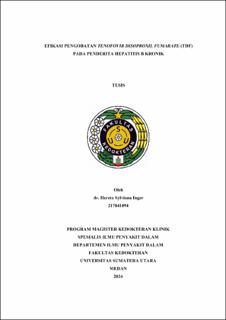| dc.description.abstract | Background: Hepatitis B virus (HBV) infection occurs due to interactions between
HBV, hepatocytes and immune cells of the host. 1 This infection is transmitted
through exposure to infected blood and through infected body fluids. HBV infection
still occurs quite frequently in East and Southeast Asia, including Indonesia (2.5%
-10%). The prevalence of hepatitis B (characterized by positive HBsAg) in
Indonesia is at medium to high levels based on geographical differences. Tenofovir
disoproxil fumarate (TDF) is a nucleotide analog (NA) recommended as first-line
treatment for chronic HBV infection.
Method: This research is an observational study with a cross-sectional design. The
samples for this study were patients suffering from hepatitis B who came for
treatment at the Gastroentero Hepatology Polyclinic, H. Adam Malik Hospital and
received TDF. The research was conducted in July – September 2023. The sampling
technique used consecutive sampling. Samples that meet the inclusion and
exclusion criteria are recorded for basic data and then reviewed for laboratory
results in the form of HBV DNA, HBeAg, urea and creatinine levels.
Results: The number of samples that met the inclusion and exclusion criteria in this
study was 60 people. Based on demographic characteristics, the majority of
sufferers are men, of Batak ethnicity, with a bachelor's degree. The majority of
sufferers have used TDF for 12-24 months with HBV DNA 2000-100000. This
research also shows that there is a significant relationship between the duration of
TDF use and HBV DNA load levels (Asymp. Sig value 0.023). The results also
showed that there was HBeAg seroconversion in 44.1% and 55.9% did not
experience HBeAg seroconversion.
Conclusion: The efficacy of TDF increases with increasing duration of TDF use in
chronic Hepatitis B patients. | en_US |


